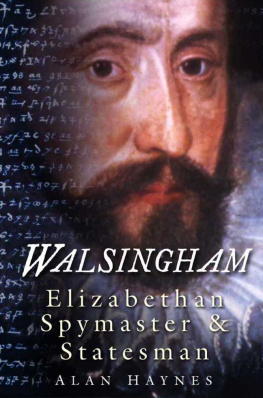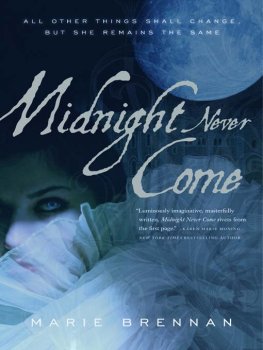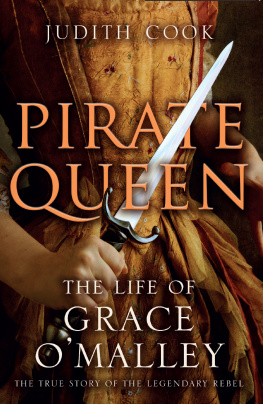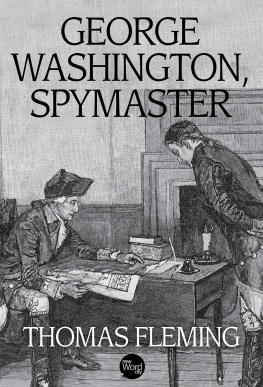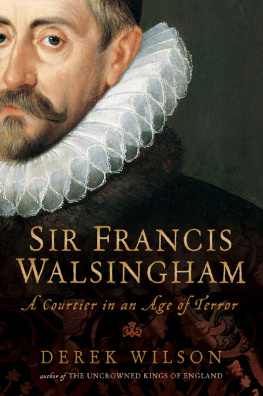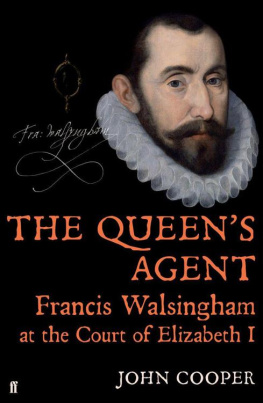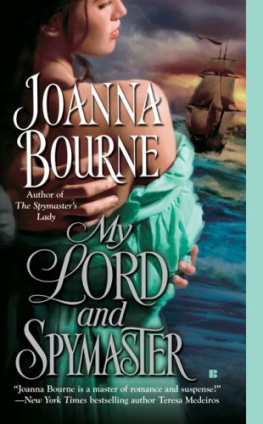Walsingham
Walsingham
Elizabethan
Spymaster &
Statesman
A LAN HAYNES

First published in 2004
The History Press
The Mill, Brimscombe Port
Stroud, Gloucestershire, GL5 2QG
www.thehistorypress.co.uk
This ebook edition first published in 2013
All rights reserved
Alan Haynes, 2004, 2007, 2013
The right of Alan Haynes to be identified as the Author of this work has been asserted in accordance with the Copyrights, Designs and Patents Act 1988.
This ebook is copyright material and must not be copied, reproduced, transferred, distributed, leased, licensed or publicly performed or used in any way except as specifically permitted in writing by the publishers, as allowed under the terms and conditions under which it was purchased or as strictly permitted by applicable copyright law. Any unauthorised distribution or use of this text may be a direct infringement of the authors and publishers rights, and those responsible may be liable in law accordingly.
EPUB ISBN 978 0 7524 9622 1
Original typesetting by The History Press
For N L K
My eyes on the Internet
A court is a conspiracy.
M. Bradbury, To the Hermitage, p. 139
His thoroughness was compulsive and regenerative, a pathological condition.
Don DeLillo, The Names, p. 46
Am I politic? Am I subtle? Am I a Machiavel?
Shakespeare, Merry Wives of Windsor III, i
I know of no disease of the soul but ignorance.
Ben Jonson
C ONTENTS
A CKNOWLEDGEMENTS
F or indispensable help with the preparation of this book I am beholden forever to my exceptional research assistant Nicolas Keen who provided a blizzard of new material. Over several years he saved me vast amounts of time, and much money.
Living in a Somerset village, far from research libraries, I deluged my local branch library with requests for difficult-to-obtain books. The ladies of the library were very helpful. They would have had an easier professional life if I had researched this book while abroad as I had hoped but that did not happen. Nor did I get to spend long periods enjoying the hospitality and polite interest of the owners of any Elizabethan houses. No one was generous with provision of the family archives. Just my luck!
Writing outside the academy can be lonely and somewhat daunting. I have been very fortunate in my chosen general reader, Emeritus Professor Park Honan, a distinguished biographer in his own writings.
I am also grateful to Dr Simon Adams (Strathclyde University), a specialist in the period, for reading, commenting and correcting. If, from time to time, he recoiled as at a bad smell I hope he thinks still that it was a task worth doing. Dr M. Leimon must be thanked since he kindly allowed me to use material from his Cambridge PhD thesis.
Funding from the OppenheimJohn Downes Memorial Trust greatly relieved the cost of preparing a handwritten manuscript for publication.
Since a crushing conjunction of events in 1998 I have had wonderful support from the Royal Literary Fund and its administrators help that has been critical to my well-being and so to the writing of this book.
Finally, the Hlne Heroys Foundation (Switzerland) helped immeasurably by funding the last stages of writing, before becoming defunct.
I NTRODUCTION
T he nineteenth-century fashion for two-or three-volume biographies was sliding exhausted towards a temporary oblivion, when early in the twentieth century a graduate student at Yale Conyers Read began studying the life and work of Sir Francis Walsingham (153090). After completing his doctorate Read went on to achieve a rare mastery of the political and diplomatic history of Elizabethan England. His appetite for the manuscript sources available then, and subsequent printed material, was almost unlimited, and at length he produced Mr Secretary Walsingham and the policy of Queen Elizabeth, published in 1925. These acclaimed three volumes, with copious references and often lengthy quotations from documents, are rightly still recommended for student reading, and gratefully pillaged by them for essays. But even Read ignored or scampered over elements of Walsinghams career, and the possible fourth volume was not written.
After publication the behemoth biography broke down, collapsing under the weight of its research effort and the light, voluptuous kicking delivered by an entirely different kind of writer the lean and not very learned Lytton Strachey. Few now bother to read him, while in marked contrast the academy has constantly and rightly cited Read on Walsingham. Even so, I suspect that the text has been as much dozed over in airless university libraries as pored over with gratitude. And Read had another effect; three volumes effectively smothered any later historians inclination to take on the same subject. Now, after eighty years, the first single-volume biography of the redoubtable statesman and spymaster is here available for students and the general reader, placing the life it sets out within the rich historical and social context. For Read, the diplomacy of the Elizabethan Secretary of State was more significant, and dignified by detail, than espionage, but recently historians have been less fastidious, and Walsinghams activities and direction of the clandestine world have once again been scrutinised to greatly rewarding effect.
Those who served under him as intelligencers and spies were just as he was men of the age. His subtle authority over the greedy, the feckless and the nervily patriotic stemmed from his candid purpose to protect Elizabeth I and advance the Protestant cause when she fumbled the politics. Although desperate for employment spies could be scathing about their place of work; so Henry Wotton considered Florence a paradise inhabited by devils. Yet he seems to have relished the challenge of posing for years as a German Catholic, and was able to penetrate areas of religious controversy undreamt of by other spies. Walsingham put together and consolidated with gold a spy service that mesmerised European rulers, especially as like a great swordsman he developed a startling instinct for when to pause, when to catch brief breath, and when to lunge for the heart. No wonder his enemies feared him, and the unknowable number of his agents.
Was that a snort of derision from his Queen? She was never comfortable with the tireless intellectual, and creative dissonance centred their dealings. No doubt beside the man in black she felt gaudily frivolous, and his unremitting loyalty could seem like pressure or a challenge. However so in their frequent meetings, argued exchanges and letters galore, the one could test the other almost to breaking point. Yet the possible even probable rupture never came, and though the haughty arch Tudor could rail against him, once deflated even she had to admit that his breadth and vigour of mind were irreplaceable; a proven fact when he died exhausted in 1590. For his part, as the years passed he grew in confidence, and he found ways to achieve an essential elasticity in government policy. Also pressed into service was the element of the apocalyptic in his imagination, as a result of his time as ambassador to France. Elizabeth must have been unaware of it when she appointed him, and although reluctant to go to such an expensive, corrupt place, he became the resident ambassador to the Valois court. So it was he who had the shocking misfortune to be in Paris during the Massacre of St Bartholomew in August 1572.
Thousands of French Protestants (Huguenots) were murdered in Paris and in towns across France by French Catholics. Among the mutilated dead were friends and acquaintances of Walsingham, whose own life was at risk. The depravity of what happened left the little cluster of Englishmen and foreign nationals in the locked and guarded embassy, aghast. The horror was psychologically overwhelming, yet when Walsingham emerged early in September for meetings with King Charles IX and the Queen-mother, Catherine de Medici, he seems not to have faltered the diplomat in him prevailed. What had prepared him to show such strength under pressure? The answer must surely be his reading and his education abroad. Exiled from Marian England, Walsingham had furthered his intellectual expansion by time spent at the University of Padua. He had become a stoic a crucial psychological prop for survival and sanity. Moreover, in the time of exile he became a cultivated
Next page
